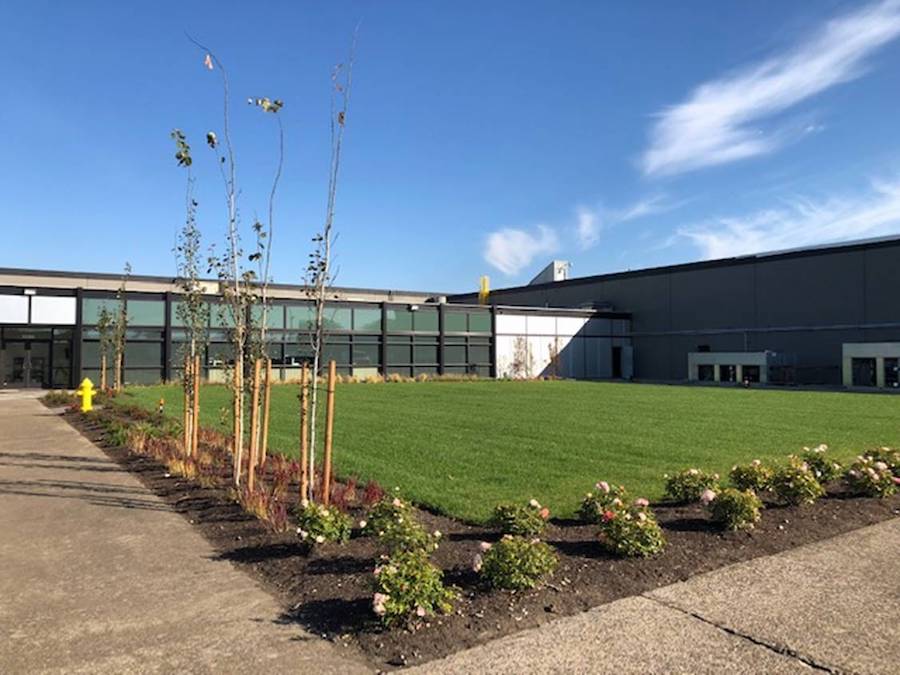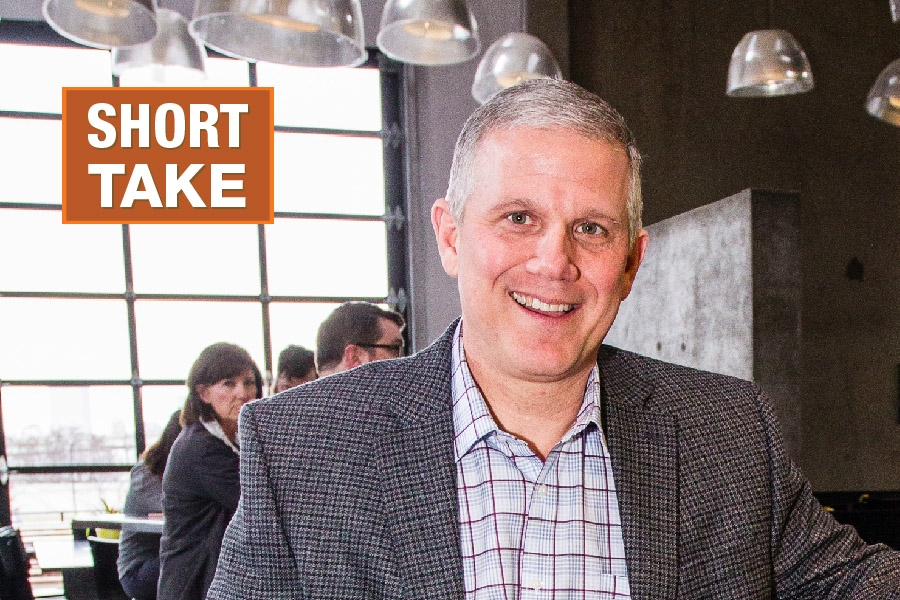Chris Sarles, CEO of Oregon Fruit Products, discusses how to innovate at the helm of an 83-year-old company.
Since Chris Sarles joined Salem-based Oregon Fruit Products in 2014 as the CEO, the company’s revenue has doubled. Diversification has been at the center of his growth strategy. Sarles set about expanding product lines after joining the former family-run business, which is known for its black-labeled cans of fruit. He expanded new business divisions: a foodservice and ingredients section that sells fruit products to restaurants, as well as launched a department that sells fruit purees to craft beverage producers.
This year the company outgrew its Salem facility, which had been its home since it was founded by the Gehlar family in 1935. (The Gehlar family sold the business to Ed Maletis, the former owner of Columbia Distributing, in 2011.) It recently moved into a bigger, 168,000 square-foot facility in Salem, which was formerly occupied by Norpac Foods.
In this interview, Sarles reflects on the challenges of going organic, the limitations of the export market and his efforts to retain staff when labor availability is tight.
This interview has been edited for length and clarity.
What areas of the business are driving the most growth?
We wanted to diversify and make sure the company had multiple legs to its stool for growth. We put a lot of emphasis into the food-service business, as well as the “fruit for fermentation” business and our ingredients business. Those are areas that have helped drive growth over the past few years.
What growth opportunities are there in food service?
Restaurant dining or quick-service restaurants continue to grow both in the number of concepts and the number of units. We decided that would be a good place to place a bet: to create products that could be placed in those restaurant concepts. We have produced products that go anywhere from toppings on yogurt and cheesecake to strawberry lemonades.
What is the market like for fruit-flavored beverages?
Many in the craft beverage business — whether they are craft soda producers, breweries, distilleries — use fruit for flavoring. Coming from the beer and wine distribution business, I thought it might make sense to go after that market, because we know a few people we could connect with and begin to kick it into gear.
 Oregon Fruit Products’s new facility in Salem, formerly occupied by Norpac Foods
Oregon Fruit Products’s new facility in Salem, formerly occupied by Norpac Foods
Do you see opportunities to export products?
We export to roughly 15 countries. Because of the costs of exporting, the market is expensive. We have tried to make sure we are supporting business that we have, but we do not chase it. We don’t have people traveling the world to try to sell fruit; the cost benefit isn’t there. I like exporting because it diversifies the business — but the time and energy we have as a small company can be put to better use here in the U.S.
How has consumer preference for organic, locally produced food affected your approach to business?
Our focus on quality has never wavered. We always look for the best product we can buy for fruit. Our blueberries may come from 9 miles away. When we are telling a story to our buyers, whether that is a restaurant chain or a fermentation customer, they always love to know we are buying local and supporting local. Obviously, we don’t buy blood orange from someone in this area; we look for quality producers wherever that blood orange comes from. Oftentimes, the focus is on quality even more so than simply being local. We have strong demand for local in our local restaurants, but there is demand for the same fruit in Florida.
Are your products organic?
We are organically certified as an operation. But we don’t currently produce any organic products. To date, the price for organic has been so dramatically different. When customers call and ask if we make an organic product, we say we can, but when we let them know what the cost would be, they typically say they would rather get the traditional product. We are going to move ahead with the production this year of a couple of organic products in a test to see how customers respond.
How much more costly would it be to produce an organic fruit product?
That is a hard question to answer because it is like asking how much a car costs. What kind of car do you want? If I give you a number, it will be inaccurate. One fruit price might be 70% more, another might be 2% more, another might be 30% more. It is all over the board.
Would you have to get out of canned packaging to be organic?
We are not going to do canned organic. We will be doing something organic that goes into either the ingredients business or the fermentation business. Those are the customers who are likely to buy organic, because we will be doing it in a puree form.
Where do you see the food-processing market in 10 years’ time? Any big changes ahead?
I continue to see a strong interest in not only fruit but food in general. It feels to me that consumers continue to like to talk about and explore local. Consumers love to try something new. There will be innovation, whether it is the addition of new fruit types or new places where we can introduce fruit into the diet.
Is the food-processing sector getting more competitive?
There has been lots of consolidation. Our goal has been to stay focused on what we do best. We are not trying to be everything to everyone but to stay in our specialty. For a company like Oregon Fruit, that is our best approach — versus trying to fill our warehouse with different things and then finding ourselves diluting our efforts so much that we can’t be good at everything. We try to stay focused so we can be good at what we do.
How is the tight labor market affecting you?
We face labor shortage. We continue to work to focus on people. Our goal is to retain staff, for them to want to stay.
How does that translate into wages? Have you increased salaries to deal with the tight labor market?
No. We watch and follow trends in the market. But that hasn’t been significant.
How have you worked to retain people?
I believe people want to work at an organization where they feel they are cared for, like they are part of the team, that they have a voice. We spend a lot of time on those areas. I think people feel it is a very collaborative environment. If you take the time to focus on people, that is a winning formula.
To subscribe to Oregon Business, click here.





